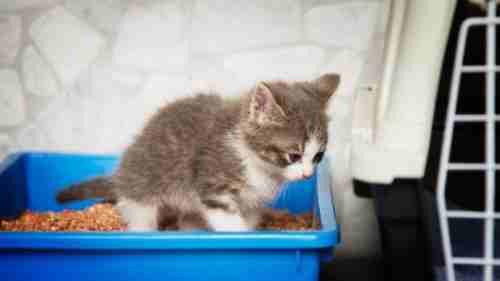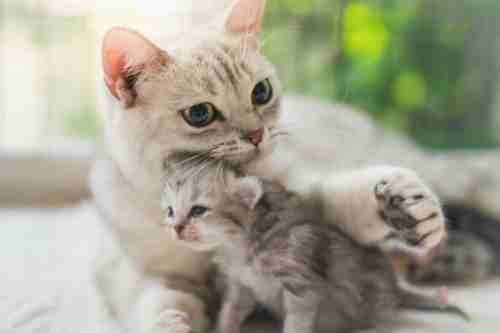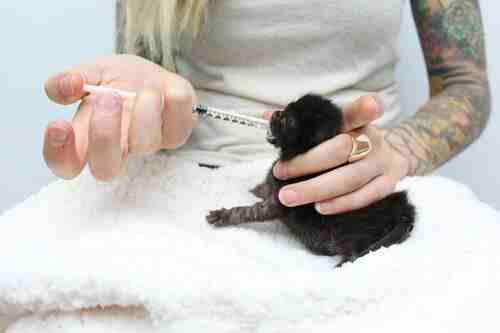Kittens make lots of adorable noises like meows purrs and chirps. One of the least enjoyable cat sounds is the “scrape-scrape” within the post-potty litter box break.
It’s a crucial one. If you haven’t seen it for some time, you could have a kitten with constipation in your midst.
Are you unsure of what to do? In this article on how to make kitten poop, we’ll discuss seven suggestions to treat and prevent constipation for your cat’s furry friend.
Constipation symptoms in Cats

The first thing you’ll likely be able to notice is that you’ve not been required to clean your cat’s litter box for a couple of days.
Kittens pee anywhere from one to six times a day, with some kittens only peeing once per 24 hours. It’s best to keep a record of your kitten’s routine to take note of any times the pattern of their poop seems to be different in comparison to the normal.
You may also spot your kitten in the litterbox struggling to poop, but not getting any success. When they finally do pee it could be less dry and more difficult than usual.
A good sign is the poop of your kitten should be moist enough to allow the litter container to stick to it. If not, it’s an indication that the poop has become too dry.
Other signs that your cat could be showing signs of could be:
- Lethargy
- Vomiting
- Insomnia and lack of appetite
- Changes the way they drink
- Weight loss
- Hiding
- Stiff walking
Kitten Constipation Causes

The dehydration of a cat is one of the causes of constipation. It is usually the case when the kitten doesn’t possess a bowl of water and only eats dry food or is in the process of weaning as it is transitioning off of the milk of its mother. The stools it passes through–if they are ever produced–will be extremely hard and small.
When kittens eat anything that creates a blockage in the stomach or intestines may be unable to flush. This is a common occurrence for curious kittens who eat items like floss, ribbons hair ties, and various other household items that aren’t enough to fit into their mouths. The food item stops food from going through or even binds into the intestines so that normal peristalsis cannot transport things around the body of the kitten. Hairballs can cause kittens to be a position to not be able to urinate.
The kittens who are still weaned must be encouraged to urinate. Cat mothers usually do this by licking their rectums on their infants. If a cat’s mother doesn’t do this, the kitten may become constipated, unless the human wipes the kitten’s rectum, which stimulates it to eliminate stool.
A high burden of intestinal parasites could make a kitten constipated. The worms may become abundant in the intestines, and result in a blockage, preventing stool from passing.
Although it is more prevalent with older kittens, neurological issues and other diseases can cause kittens to become constipated or even obstipated.
Baby Kittens Do Not Poop on All on Their
It’s also crucial to recognize that neonatal kittens – those who are less than one month old may not be physically able to go to the bathroom without assistance. Little kittens need stimuli from the mother’s voice for defecating. If they’re orphaned they’ll require gentle stimulation by a caretaker before every meal. Make use of a soft cloth or a baby wipe to stimulate the cat’s anus with a circular motion. moving continuously until the kitten is peeing. This signals the body of the kitten to push and stimulate them to undergo a bowel movement.
Change Up Their Diet

What goes into your body indeed influences the outcome and the diet of your cat might be affecting their capacity to eliminate.
Certain vitamins can aid cats in their work–just as humans do. To help your cat who is constipated pee, you could try:
Incorporating more fiber into your diet. Foods such as carrots, as well as pumpkin, and rice, are all rich in moderate amounts of fiber, which can aid your cat to manage constipation. If you have a cat who isn’t a fan of your food it is possible to add a feline-safe fiber supplement such as Metamucil or Vetasyl over your food. A high-fiber diet may not be the best option however it could be beneficial.
Probiotics are foods that contain probiotics. Probiotics are bacteria that control the health of your intestine and gut. Because these areas are in the places where “magic” happens during stool movements, making sure they are in good health can assist your kitten to eliminate. For this reason, look for brands of cat food with probiotics.
The change in your kitten’s diet may be a temporary solution to an occasional case of constipation in cats. However, if the problem continues it is possible to look at other strategies or see your vet.